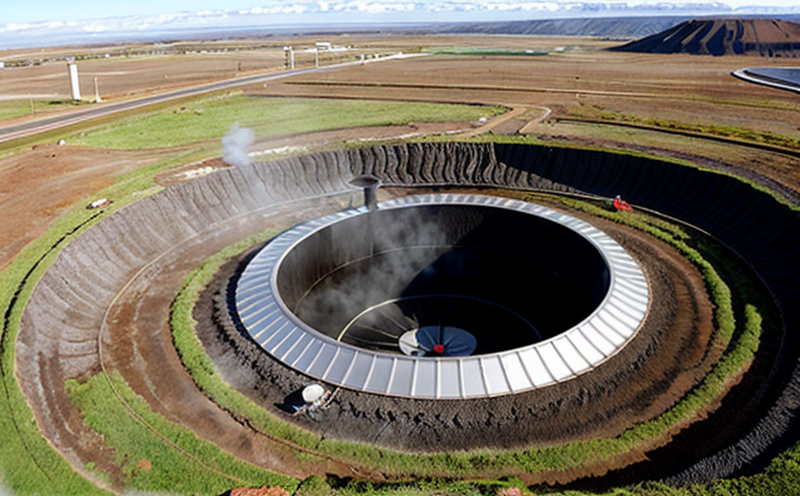ASTM D7604 Laboratory Thermal Response Testing of Boreholes
The ASTM D7604 laboratory thermal response testing (LTRT) method is a crucial technique used to evaluate the thermal properties and performance of geothermal energy systems, particularly borehole heat exchangers. This service allows for the determination of key parameters such as the maximum temperature drawdown, the time required to achieve this drawdown, and the rate of recovery after the test. These metrics are essential for understanding the efficiency and capacity of a geothermal system.
The ASTM D7604 standard is widely recognized in the energy sector due to its comprehensive approach in simulating real-world conditions within a controlled laboratory environment. This service enables quality managers, compliance officers, R&D engineers, and procurement professionals to ensure that their systems meet stringent performance requirements before deployment. By using this method, stakeholders can optimize system design, enhance operational efficiency, and reduce lifecycle costs.
During the LTRT process, a test loop is set up in the laboratory environment to mimic the conditions of the borehole field. The test setup typically includes a heat exchanger connected to a water reservoir with controlled temperature. The system is then subjected to thermal loading and unloading cycles to simulate the operational conditions of geothermal systems.
The primary objective of ASTM D7604 testing is to provide reliable data on the performance characteristics of borehole heat exchangers under various operating conditions. This information is vital for assessing the long-term reliability, durability, and efficiency of geothermal energy systems. The test results help in selecting the appropriate system configuration for different applications, ensuring optimal thermal performance.
It is important to note that the ASTM D7604 standard ensures consistency and accuracy across various laboratories conducting this type of testing. This uniformity allows for meaningful comparisons between different borehole heat exchangers and facilitates industry-wide standards compliance.
The LTRT method also provides valuable insights into the thermal behavior of boreholes, which can inform design improvements. By understanding how a system responds to specific thermal loads, engineers can refine their designs to better match real-world usage scenarios. This not only enhances the performance but also extends the lifespan of geothermal systems.
The ASTM D7604 test protocol is designed to be rigorous and comprehensive, ensuring that all relevant factors affecting borehole heat exchanger performance are considered. The controlled laboratory environment allows for precise measurement and analysis, which would otherwise be difficult to achieve in a field setting. This precision is crucial for maintaining the integrity of the testing process and providing reliable data.
The results from ASTM D7604 testing can significantly influence decision-making processes within the energy sector. By providing accurate and consistent performance metrics, this service supports informed choices regarding system selection, installation, and maintenance. The insights gained from these tests can lead to more efficient operations, reduced energy consumption, and a lower environmental footprint.
The ASTM D7604 standard is particularly useful for quality managers, compliance officers, R&D engineers, and procurement professionals who need to ensure that their geothermal systems meet stringent performance requirements. This service supports the development of high-quality products and services, contributing to the overall advancement of energy efficiency in the sector.
Applied Standards
| Standard | Description |
|---|---|
| ASTM D7604-18 | Laboratory thermal response testing of boreholes for geothermal applications. |
| ISO 23594:2013 | Standard test method for measuring the heat transfer coefficient and related properties of vertical ground-coupled heat exchangers in a laboratory environment. |
| EN 15316-1 | Specification for borehole heat exchangers - Part 1: General requirements. |
Benefits
- Precise measurement of thermal performance under controlled conditions.
- Consistency and reliability in testing results across different laboratories.
- Support for informed decision-making regarding system selection, installation, and maintenance.
- Enhancement of operational efficiency and reduced lifecycle costs.
- Facilitation of compliance with industry standards and regulations.
- Precision in understanding the thermal behavior of boreholes, leading to design improvements.
- Support for the development of high-quality products and services within the energy sector.
Competitive Advantage and Market Impact
- The ability to provide accurate and consistent testing data supports competitive differentiation in a market driven by performance metrics.
- Support for compliance with international standards ensures that systems are up-to-date with the latest industry requirements, enhancing credibility and trust among stakeholders.
- Precision in understanding thermal behavior can lead to innovations in geothermal technology, potentially opening new markets or applications.
- The service helps in optimizing system design, which can result in more efficient operations and reduced energy consumption, contributing positively to environmental sustainability goals.
- By ensuring that systems meet stringent performance requirements, this service supports the development of high-quality products and services within the sector, driving overall market advancement.





